Having explicitly dealt with what Sharia banking entails in our previous article, it becomes imperative to know the line of divides between conventional banking and Islamic banking.
It’s important to note that the word ‘sharia’ in this context doesn’t mean ‘only Muslim. We pointed out that Sharia banking is designed to accommodate Christians and Muslim and everyone irrespective of religious beliefs
What is Conventional Banking?
Also known as interest banking, conventional banking is a financial system whereby financial institutions accept deposits from their customers and give cash loans for the purposes of making profits through interest.

Major difference between a conventional bank and Sharia bank
We can look at the distinctions between both banking systems using:
- mode of operation of savings accounts,
- leasing,
- lending,
- Penalty charges
- Gambling
- Profit
- Risk
- Uncertainty
- Mode of operation of current accounts
Lending:
Conventional banks are in the business of lending and borrowing based on interest.
On the other hand, the Islamic banking financing system is operated as an investment house. No lending for interest.
Speculation:
Borrowing money with the aim of making profit may be tainted with uncertainty because anything could happen, yet conventional banks engage in uncertainty whereas Non-interest banks don’t do business or investment that is speculative.
Although there are still debates about whether Muslims can invest in cryptocurrency or not. Crypto trading is very volatile and speculative.
Compensation:
Compensation in conventional banks is always interest, but the price (Thaman) is the compensation in Sharia banks.
Saving Accounts:
The saving account is operated by the conventional bank as a debtor-creditor relationship while the Islamic saving account is operated based on partnership (Mudarib, Rab-ul-Maal/Partners).
Penalty charges
Conventional banks see a penalty on late payment as income but in Sharia banking, a late fee on a rental is paid into the account of charitable organizations.
Gambling:
Gambling or casino-related investment is forbidden in Non-interest banks because profit should not be earned by game of chance or luck.
But some of the conventional banks are partners with some of the gambling or sporting-betting firms.
Profit
Islamic banks generate profits by way of work and effort. Whereas conventional banks make profit from interest and other methods that may not be Sharia-compliant.
Risk-sharing
While Non-Interest Banks share risks with their customers, conventional banks don’t. They may take over their customers’ property if they fail to pay back their loans.
Conclusion:
The Sharia banking system is more advantageous to small businesses than conventional banking.
In terms of fairness, Non-Interest banks (Islamic banks) are better than Interest banks (interest banks)

